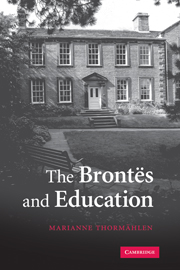Book contents
- Frontmatter
- Contents
- Acknowledgements
- Abbreviations and editions
- Introduction
- I EDUCATION AND SOCIETY
- II HOME AND SCHOOL
- 3 Household education versus school training
- 4 Parents and children
- 5 Professional educators in the home
- 6 Schools and schooling
- III SUBJECTS AND SKILLS
- IV STRATEGIES AND METHODS
- V ORIGINALITY AND FREEDOM
- Notes
- Select bibliography
- Index
5 - Professional educators in the home
Published online by Cambridge University Press: 22 September 2009
- Frontmatter
- Contents
- Acknowledgements
- Abbreviations and editions
- Introduction
- I EDUCATION AND SOCIETY
- II HOME AND SCHOOL
- 3 Household education versus school training
- 4 Parents and children
- 5 Professional educators in the home
- 6 Schools and schooling
- III SUBJECTS AND SKILLS
- IV STRATEGIES AND METHODS
- V ORIGINALITY AND FREEDOM
- Notes
- Select bibliography
- Index
Summary
GOVERNESSES IN FACT …
Those Brontë characters who must earn their living by undertaking the job that parents were unable or unwilling to do, educate children in their own homes, face many obstacles in their attempts to develop the faculties of others while at least retaining their own. The biographical connection is apparent: all the Brontë children except Emily had resident posts as governesses or tutor at one time or another, and all experienced varying degrees of unhappiness in their jobs.
In this, of course, they were not alone. Throughout the nineteenth century, the tribulations of governesses filled thousands of pages of print, in the form of manuals for governesses, advice to parents, articles and letters in journals and newspapers and, finally, fictional tales numerous enough to form a genre of their own.
All discussions of Victorian governesses in fact and fiction dwell on their difficult social position. Neither ‘family’ nor servants, they were often despised downstairs as well as upstairs. Their charges, sensing the poor status of the women who tried to control them, would cheerfully rebel against attempts to enforce obedience. The children's mothers, jealous of any affection a governess might manage to win from their offspring, would constantly undermine her efforts. The fact that many parents who employed governesses were themselves badly educated parvenus made matters worse, especially as some of them were uncomfortably aware of their inferiority in this respect.
- Type
- Chapter
- Information
- The Brontës and Education , pp. 48 - 62Publisher: Cambridge University PressPrint publication year: 2007



